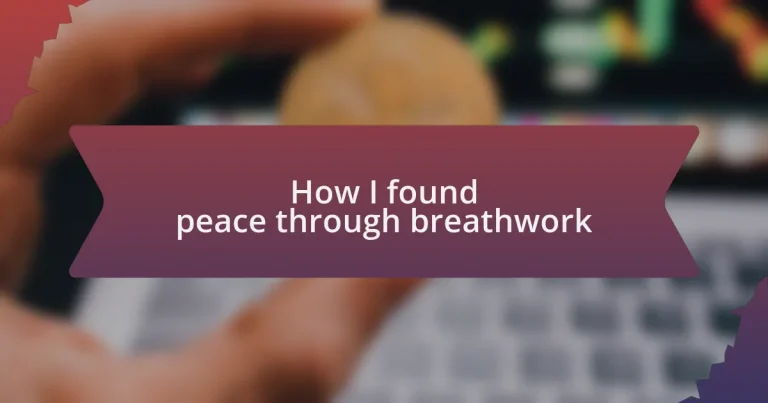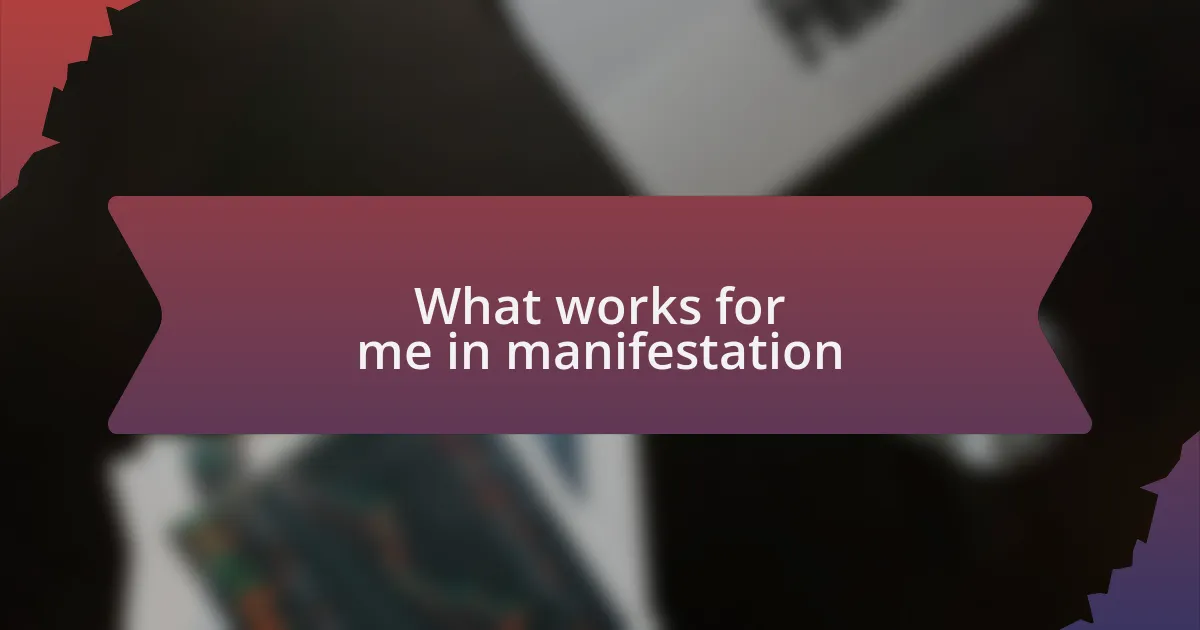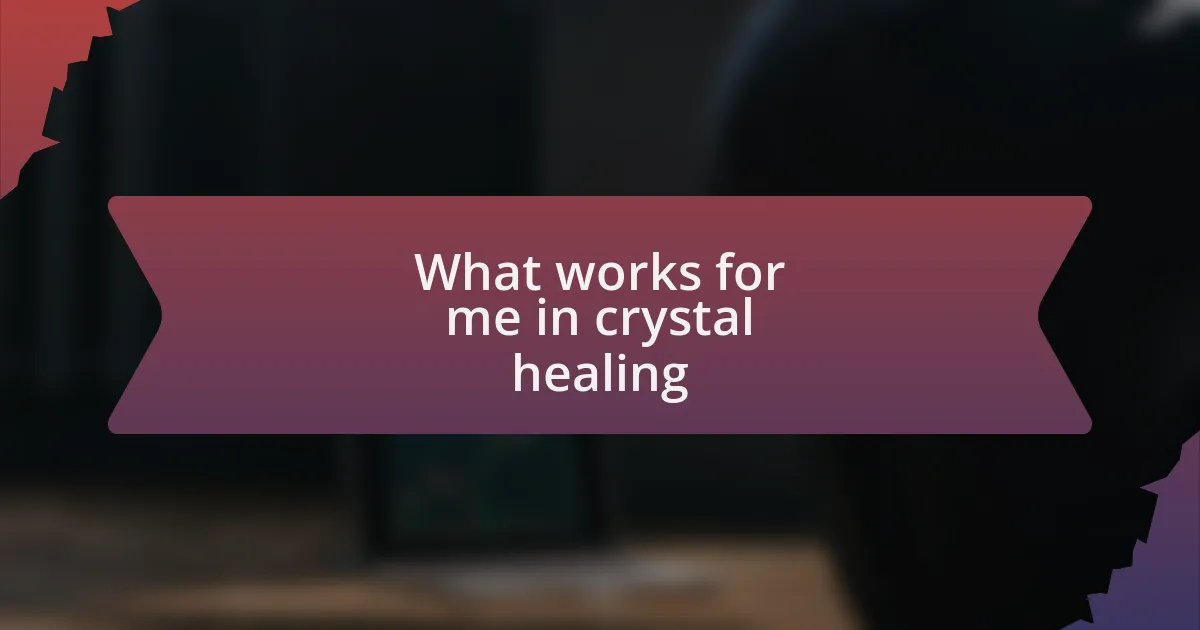Key takeaways:
- Breathwork techniques, such as the 4-7-8 method and holotropic breathwork, foster emotional release and self-discovery.
- Practicing breathwork regularly enhances inner peace, reduces anxiety, and promotes emotional resilience.
- Integrating breathwork into daily routines creates mindfulness and transforms ordinary moments into opportunities for presence.
- Sharing breathwork experiences on platforms like podcasts helps foster community and encourages others to explore their own journeys of self-discovery.
Author: Evelyn Hartman
Bio: Evelyn Hartman is a contemporary author known for her evocative storytelling and rich character development. With a background in psychology, she weaves intricate narratives that explore the complexities of human relationships and personal growth. Her debut novel, “Whispers in the Wind,” garnered critical acclaim and established her as a powerful voice in modern literature. Evelyn resides in the Pacific Northwest, where she draws inspiration from the vibrant landscapes and diverse communities around her. When she’s not writing, she enjoys hiking, gardening, and spending time with her two rescue dogs.
Understanding breathwork techniques
Breathwork encompasses various techniques that focus on controlling your breath to achieve different outcomes, from relaxation to heightened awareness. I remember my first experience with circular breathing; it felt as if I was riding a wave of energy. How incredible is it that something as simple as focus on our breath can lead to profound emotional release?
One technique that particularly resonated with me is the 4-7-8 method. In moments of stress, just counting my breaths gives me a sense of control and calm. Have you ever tried slowing down your breathing with a specific count? It’s fascinating how such a small shift can create a ripple effect in your entire day.
Another impactful approach I’ve explored is holotropic breathwork, which is designed to tap into deeper states of consciousness. During a session, the intensity of the breaths almost transported me to another realm. Isn’t it intriguing to think that our breath can serve as a gateway to self-discovery and healing? Each technique offers a unique journey, inviting us to explore the inner landscapes of our minds and emotions.
Benefits of breathwork for peace
Breathwork has immensely enriched my understanding of inner peace. When I practiced deep abdominal breathing, I noticed a transformative wave of tranquility washing over me. What surprises me is how just a few minutes of focused breath can help quiet the chaos in my mind, almost like hitting a reset button on my day.
One memorable experience with breathwork taught me how to center my thoughts during anxiety-inducing moments. A simple technique of inhaling for four counts, holding for seven, and exhaling for eight helped ground me when I felt overwhelmed. Have you ever experienced that gentle shift from tension to serenity through something as natural as your breath? It’s almost magical to realize that such an accessible tool can bring profound stillness.
The psychological benefits of breathwork are compelling as well. As I regularly incorporated these practices into my life, I noticed a significant reduction in anxiety and an overall increase in my emotional resilience. Doesn’t it make you wonder how often we overlook such fundamental aspects of our existence? Focusing on breath not only cultivates peace but fosters a deeper connection to ourselves and the world around us.
How breathwork connects to mindfulness
Breathwork serves as a gateway to mindfulness by centering our awareness on the present moment. I remember sitting in a quiet room, focusing solely on my breath, and feeling an awakening in my consciousness. It was in those moments that I truly grasped how breathing deeply and intentionally could usher me into a state of heightened awareness, allowing me to appreciate the now without the distractions of the past or future.
As I delved deeper into breathwork, I noticed a shift in my daily interactions. I began to approach situations more mindfully, responding rather than reacting. Have you ever felt the urge to rush into decisions only to regret them later? By taking a few breaths before responding, I found clarity and a sense of calm, which helped me navigate life’s challenges with grace.
Mindfulness through breathwork doesn’t just quiet the mind; it connects us to our emotions, creating a profound understanding of ourselves. There was a time when I faced emotional turmoil, and simply focusing on my breath helped me unearth feelings I had buried. Connecting with my breath allowed those emotions to surface gently, guiding me towards healing and introspection. Wouldn’t you agree that this kind of self-awareness can be transformative?
Personal journey with breathwork
Breathwork has been a crucial part of my personal journey towards tranquility. I vividly recall my first session, where I felt a mixture of vulnerability and curiosity wash over me. As I inhaled and exhaled, I found myself stepping into a deeper relationship with my body, uncovering layers of tension I didn’t even realize I was holding. Have you ever noticed how physical stress can echo in your mind? That’s exactly what I experienced—each breath peeled away the chaos within.
As I committed to regular breathwork practices, my connection to my emotions deepened. I remember one particular day when I felt overwhelmingly anxious about an upcoming transition in my life. Instead of spiraling into worry, I turned to my breath. With every intentional inhale, I let go of fear, and with each exhale, I replaced it with hope. Isn’t it incredible how something as simple as breathing can shift our perspective and provide solace in turbulent times?
Over time, breathwork became a sanctuary for me—a safe haven where I could explore my innermost feelings without judgment. I found that in these quiet moments, I could sit with my thoughts and reflect on my choices. There were instances when unresolved memories surfaced, but rather than feeling overwhelmed, I embraced them with compassion. Have you ever experienced that moment of clarity when an old wound reveals itself, allowing you to heal? For me, breathwork was the key that unlocked that door, guiding me toward a profound sense of peace.
Overcoming challenges in breathwork practice
Sometimes, engaging in breathwork can feel like wading through a fog of distractions. I recall one session when a barrage of thoughts about my daily responsibilities interrupted my focus. In that moment, I learned to gently acknowledge those thoughts instead of resisting them. By simply observing my mental chatter and returning my attention to the rhythm of my breath, I discovered that acceptance is a powerful tool in overcoming mental obstacles.
Every breathwork session has its challenges, and there are days when diving deep into my emotions feels daunting. On one particularly difficult occasion, I was met with feelings of sadness that I had buried for too long. Rather than shying away from this discomfort, I chose to breathe through it. It was in that vulnerable state that I recognized the beauty of allowing emotions to flow freely. Have you ever let your heart speak through your breath? It’s a liberating experience that turns struggles into stepping stones on the path to inner peace.
As I continued my breathwork journey, I encountered physical discomfort that once deterred me from fully committing. I remember feeling tightness in my chest, which made it hard to fully inhale. Instead of giving in to frustration, I listened to my body, adjusting my position and finding support in a cushion. I realized that respecting my physical limits was just as important as pushing through them. This loving approach transformed what could have been an obstacle into a moment of self-discovery. Isn’t it fascinating how challenges can become gateways to greater self-awareness?
Integrating breathwork into daily life
Integrating breathwork into daily life feels like embracing a constant companion. I’ve made it a ritual to pause and engage in a few deliberate breaths whenever I feel overwhelmed, whether I’m at my desk or standing in line. Those moments, however brief, create a pocket of clarity that helps me prepare for whatever comes next—kind of like hitting the reset button on my emotions.
One practical technique I discovered is weaving breathwork into mundane activities. For instance, I practice deep breathing while washing dishes or during my commute. It transforms these ordinary moments into opportunities for mindfulness, reminding me to stay present and connected to my body. Have you ever noticed how the simplest tasks can hold profound moments if we just take a breath?
Moreover, I’ve started to identify specific times of the day that are ideal for a breathwork session, such as first thing in the morning or right before bed. This intentional scheduling has turned breathwork into a cornerstone of my routine. It has made a remarkable difference, fostering a greater sense of peace and grounding. Have you tried it? Finding those pockets of time can be a game-changer.
Sharing breathwork experiences on podcasts
Sharing breathwork experiences on podcasts can be a transformative way to connect with listeners. I recently shared my own journey on a podcast and was surprised by how many people reached out afterward, sharing their stories of using breathwork to find balance during chaotic times. It’s as if we were all part of a community, united by our struggles and discoveries.
One insightful moment came when a guest on a different podcast mentioned how breathwork helped her navigate anxiety during a particularly challenging period in her life. Hearing her recount those frightening nights where breathing felt like a battle reminded me of my own experiences. Have you ever found that someone’s vulnerability can mirror your own hidden struggles? That connection is powerful and can create a safe space for listeners to explore their breathwork journeys.
I’ve noticed that the discussions surrounding breathwork on podcasts often spark curiosity in unfamiliar listeners. When I shared a specific technique, like the 4-7-8 breathing method, during a recent episode, several listeners later tried it and reported feeling calmer and more centered. It’s fascinating to think that just by sharing my experiences, I might inspire someone to take their first breath in a new direction. How amazing is it that our voices can be a catalyst for personal growth?





